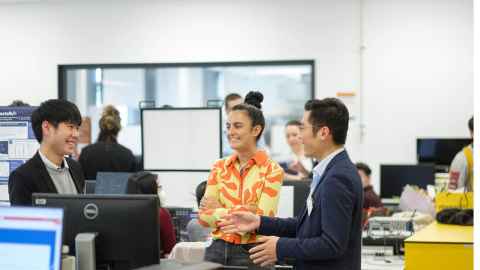Perfecting the Māori ‘R’ in speech tech
16 September 2024
The /r/ sound plays a critical role in both speech technology and language revitalisation, says electrical engineer researcher Isabella Shields.

The /r/ sound in te reo Māori is one of the most difficult letters to pronounce, particularly for non-Māori speakers or those learning the language. It requires the tip of the tongue to touch quickly against the roof of the mouth, producing a distinct tapping effect.
Though seemingly simple, this sound presents significant challenges — especially in the realm of technology.
This linguistic aspect has captured the attention of Waipapa Taumata Rau, University of Auckland PhD researcher Isabella Shields (Ngāti Porou), who is working to ensure its accurate integration into speech technology. This research has potential to improve outcomes for everyday apps, like Google Maps and Siri.
At the University’s Faculty of Engineering, Isabella explores the acoustics and pronunciation of the Māori /r/ sound. Her research addresses a fundamental issue: technology’s mispronunciation of Māori. But she believes speech technology can aid in the revitalisation of the language.
“One of the things missing from our understanding of te reo Māori is the variation in how the /r/ sound is pronounced,” she says. “My hope is that this research can bridge that gap.”
Initially, Isabella’s goal was to develop a tool to help language learners improve their pronunciation. However, she quickly realised that the complexity and variation of the /r/ sound required independent, focused research.
Her study has opened other avenues of exploration, including examining similar /r/ sounds in other languages and understanding the pronunciation differences across various iwi dialects.
“The Māori /r/ is most commonly described as a ‘tap,’ which involves a quick tap of the tongue tip against the roof of the mouth.
“Although this type of sound is found in many Polynesian languages, as well as European languages like Spanish, the Māori /r/ can manifest in many different ways. We can’t assume a sound appears and varies in the same ways from language to language.
“There are also several different /r/ sounds in te reo Māori and getting them right is crucial for both language learners and the technology being developed.”
Shields is part of the University’s Speech Research Group, which is involved in projects such as the Māori language pronunciation tool (MPAi) and a synthesised Māori voice and text-to-speech system. These initiatives aim to create language technologies that accurately reflect the unique characteristics of te reo Māori.
As technology evolves, Isabella also considers the ethical implications of Indigenous data sovereignty. While it is not her area of focus, she acknowledges its importance.
“It’s critical that data sovereignty principles inform our research practices,” she says.
“Māori should have the right to decide how their language data is used, and it should always be for their benefit.”
By merging language revitalisation efforts with advanced technology, Isabella’s research aims to ensure te reo Māori flourishes in an increasingly digital world.
Isabella hopes that, by the end of her research, it will contribute to making te reo Māori more accessible through speech technology.
“Getting pronunciation right in technology is a matter of digital equity. Māori speakers and learners should have access to technology that understands and responds in their language, pronouncing Māori sounds correctly.”
Isabella also holds a Bachelor of Arts in French and a Bachelor of Engineering (Honours) in Electrical Engineering.
Te Wiki o Te Reo Māori 2024
The theme for Te Wiki 2024 is ‘Ake ake ake – A Forever Language’. It represents the resilience, adaptability and endurance of our language. It also reflects the commitment New Zealanders have to embracing and learning te reo Māori long into the future.
Media contact
Te Rina Triponel | Kaitohutohu Pāpāho Māori
te.rina.triponel@auckland.ac.nz